Co-innovation and partnering with Maori
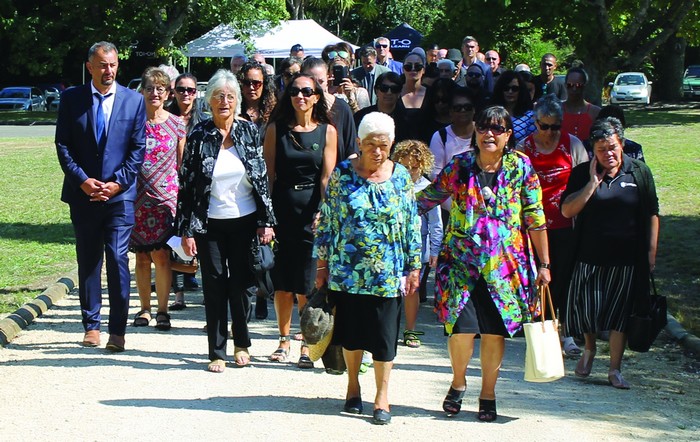
Getting everyone on the waka
The highlight of the year was the appointment of Hemi Rolleston (Ngati Whakaue, Ngai Te Rangi, Ngati Ranginui) to a new position - General Manager Maori Forestry Futures.
Hemi’s experience in the primary industries as CEO of Maori kiwifruit business Te Awanui Huka Pak and the research and development sector as General Manager Sectors and Maori Economy plus nine months as Chief Executive at New Zealand’s innovation agency Callaghan Innovation made him an ideal fit for Scion’s own primary industry-based research and development.
Making a positive difference for Maori by using his skills, connections and experience in the Maori economic and innovation space is Hemi’s passion. With Maori a significant economic entity with forestry a key resource, Hemi sees Scion being a perfect partner for Maori to achieve their aspirations through Scion’s capability and experience in forestry science and innovation.
“The biggest potential is through creating collaborations with Maori looking at innovative opportunities throughout the value chain. There is also potential to identify land use options for Maori in forestry and ensure that returns are maximised through use of innovation while balancing Maori values.
“Bringing the Maori world view into mainstream thinking and weaving in the Maori story will provide a unique point of difference. Indigenous forestry and Maori fibres provide a unique and exciting opportunity for Maori and Scion. We also need to take the tamariki of today on the journey and equip them with the skills and knowledge to provide an exciting future using this resource,” he says.
Hemi sees the biggest challenge will be changing the mindset and attitude from both Maori and in Scion. It begins with developing authentic relationships and the rest will follow with each party understanding the respective values and opportunities they can bring to the table.
“First, we must get everyone on the waka before we paddle off.”
Totara forestry in Northland
The Totara Industry Pilot (TIP) project is evaluating a potential industry based on regenerating totara in Northland. One year in, Scion has benefited from a partnership with a collective of Maori landowners known as Taitokerau Maori Forests Inc.
The collective initially set out as members of the steering group to diversify their existing forestry knowledge alongside Northland Totara Working Group and Tane’s Tree Trust, other regional champions of totara. Bringing their Maori landowner experience, intergenerational values, traditional knowledge and relationships the collective has positively influenced the brand, culture and appeal of a totara industry by using a local narrative.
Such influence was shown when the TIP Steering Group used Northland totara timber donated by Scion on the restored floor of the Samuel Marsden Church in Matauri Bay. In January 2019, the community came together to dedicate the new floor.
Through TIP, Scion was also introduced to Ngati Hine Forestry’s totara breeding aspirations and has co-developed a research programme to deliver economic, environmental, social, and cultural breeding outcomes to New Zealand. An enduring relationship has developed, and we are working towards securing funding for totara breeding and future co-innovation and joint exploration of totara for carving, bioactives and ecosystem regeneration.
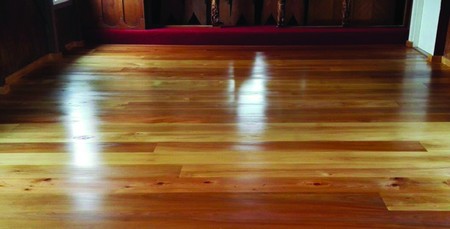
Kauri sanctuary and seed collection
When the One Billion Trees Programme launched in February 2018 Scion was invited to carry out a kauri dieback Phytophthora agicidicida soil assessment on Ngati Rehia’s culturally significant kauri sanctuary site at Takou Bay, Bay of Islands. The Scion team met with mana whenua and their neighbours to scope and carry out the project. Three workshops were held to understand their aspirations and matauranga, transfer Scion’s knowledge of the killer disease and kauri forest establishment to the people, and co-design a sanctuary for dieback-resilient kauri seedlings.
Soil tests carried out by Takou Bay rangers (rangatahi trained by hapu leaders to work on conservation) and Scion scientists showed the pathogen was not in the site. Risks were identified and communicated. A collaborative forestry management plan was delivered in December 2018, followed in January 2019 with recommendations for seed collection, collaboration with other landowners for seed crossing to improve resilience, and ongoing best practice of site hygiene and pest management to keep the disease away.
The hapu has strengthened their relationship with a broader mana whenua roopu, a collective of kauri land owners that collaborated with Scion to carry out kauri cone collection under the Healthy Trees, Healthy Futures research programme. Cones were gathered in February 2019 across 10 different sites between Kaitaia and Tauranga including kauri trees from Takou. Some of these seeds were germinated and are currently housed in Scion’s nursery. Use of the remaining seeds depends on future funding being sought by the kauri dieback mana whenua roopu and Scion to carry out a kauri restoration research partnership using seven kauri sanctuary models.
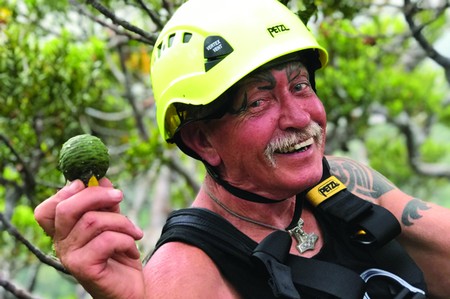
Photo: © BioSense
Minginui nursery flourishes
Scion’s relationship with Ngati Whare began in 2014 to build a business case for an indigenous nursery at Minginui that included proprietary vegetative propagation techniques for certain native trees, developed by Scion. By 2016 construction of Minginui nursery had begun, and in 2017 Scion and Ngati Whare embarked on a Vision Matauranga Capability Fund partnership to build on Ngati Whare’s unique relationship with the Whirinaki Forest and Scion’s success with nursery development and forest genetics.
Over the past year, Scion Nursery Researcher Craig Ford mentored Iwi Researcher Doreen Roberts, and the nursery produced rooted cuttings of native podocarps like kahikatea Dacrycarpus dacrydioides, miro Prumnopitys ferruginea, rimu Dacrydium cupressinum and totara Podocarpus totara. During the first stage of the research project, Craig and Doreen monitored and adjusted the growing conditions of key podocarp growing trials in the nursery. The second stage focussed on maintenance and measuring of existing nursery trials, the design and implementation of a field trial, data cleaning, interpretation of results and scientific report writing.
Through trial success and failure, we learned about the propagation of podocarps. Further advances were made in vegetative propagation protocols for podocarp cuttings and bilateral knowledge sharing in science and matauranga Maori.
In 2018, $5.8 million was granted under the Provincial Growth Fund to Ngati Whare to expand their nursery capacity from 250,000 to 1,000,000 plants per annum. As well as employing locals, the nursery was expected to draw skilled people back to the village. Immediate ramp-up to production scale was necessary and achieved through a co-management plan, with Scion’s assistance. We were also asked to provide expansion plans for the nursery, and new facilities are now underway. A new full-time nursery manager was appointed in December 2018. This project has also supplied trees to Te Uru Rakau’s One Billion Trees Programme.
The approach used by Minginui management and Scion staff highlights the broad benefits of bringing together the worlds of science and matauranga Maori to remote forestry communities. The sharing of data, knowledge, tools, and the value to science and the community have been greatly enhanced. Fellowship and comradery has grown between the teams as the result of an enduring partnership.
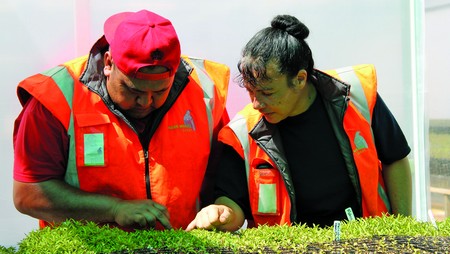
Te Arawa responds to climate change
The Te Arawa climate change adaption strategy is being reviewed for inclusion in the United Nations Handbook on Disaster Risk Reduction 2019.
This achievement began with a Scion/Te Arawa Lakes Trust partnership that employed a local Maori community researcher to develop and strengthen relationships, learn about climate change, and develop a profile for the project.
Guided by Vision Matauranga Capability Fund objectives, our community researcher has strengthened relationships and developed a presence for Te Arawa as an iwi in regional and national forums. Requests were received to join national and regional climate change projects and committees, and the Minister for Climate Change James Shaw met with Te Arawa to consult over climate change. Our community researcher also contributed to The Deep South Forum 2019.
Two Scion/Te Arawa community forums were held to facilitate the co-development of climate change research that meets the aspirations of Te Arawa community. These forums resulted in nine identifiable areas of science with the potential to be further developed.
From this work, Scion and the community have the chance to develop an integrated Endeavour research programme. Together we have developed international relations with Pasifika emergency management researchers and Northern Arizona First Nations climate change adaption group, and we are currently in conversation with First Nations groups regarding potential future projects.
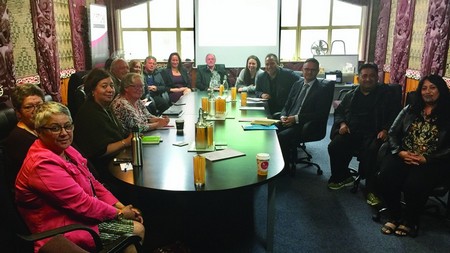
Destination Rekohu: Towards a circular bioeconomy for a remote island community
Hosted by the Hokotehi Moriori Trust, Scion staff spent four days with other CRIs exploring Rekohu (also known as Wharekauri) the big island in the Chatham Islands. There they met and discussed the sustainable development challenges and opportunities in this beautiful, wild and remote part of Aotearoa New Zealand.
Project managed by Scion, the visit, dubbed “Kaunaki Korero”, was funded by the Vision Matauranga Capability Fund and coordinated between Hokotehi Moriori Trust and Te Ara Putaiao, the CRI Maori Manager’s forum.
Farming, forestry, waste management, energy alternatives to diesel, fishing, sustainable business development and disaster response plans were on the agenda. Multiple site visits took place on farms, cultural sites, and forests with emphasis on reforestation, and the One Billion Trees Programme culminating in an evening community forum facilitated by ESR’s social research team.
A report from each CRI was collated for the trust. A road trip to the mainland is planned for an island delegation in August 2019 and will include a fisheries waste (bio and plastics) collaboration discussion, a One Billion Trees workshop, heritage site visits and an invitation to participate in a micro-abattoir forum.
Though a young collaboration, the visit hailed the beginnings of a good foundation between the Chatham Islands and the research community of New Zealand. Scion continues to be a driving force of this relationship and initiative.
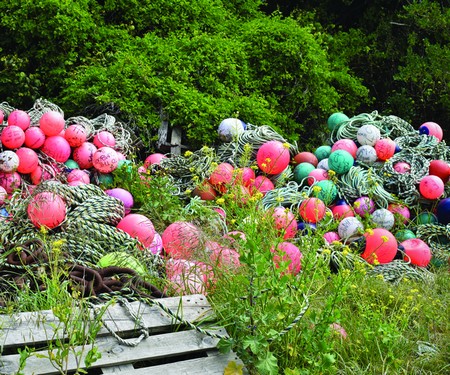
Building connections by unlocking curious minds
Scion has been building its relationships with next generation Maori partners thanks to funding from the Ministry of Business, Innovation and Employment’s Unlocking Curious Minds.
The history and importance of the sweet potato kumara to Maori is being told in a novel way in a Scion partnership with Kai Rotorua. A non-profit organisation working to reconnect people with Papatuanuku (Earth mother), Kai Rotorua’s vision is to create a more resilient, well-nourished community. Te Arawa stories tell of the kumara voyage from Hawaiki to New Zealand where, despite trials at sea, most of the kumara varieties made it to Maketu, and on to Mokoia Island in Lake Rotorua. There, kumara flourished in the gardens of Te Arawa settlers.
Three years ago, Kai Rotorua initiated a project with Rotorua Boys High School that connects learning about kumara history and matauranga with hands-on learning about growing and harvesting.
Te Rangikaheke Kiripatea of Kai Rotorua believes that the simple activity of harvesting kumara can be a tool to restore connection to Papatuanuku and can help the boys to maintain a sense of themselves amongst today’s complicated and stressful lifestyles.
Students participated in a 3D modelling workshop run by Scion at the school. Rotorua Boys High School Teacher Tiahomarama Fairhall believes that the project is of great help to the boys. “Just in this short time, I have seen the benefits of Te Kete Rokiroki, especially in regard to the boys learning to harvest kumara, learning how their ancestors grow and plant food and the science of it.”
Two more 3D printing workshops will run in August 2019 for students to learn about 3D printing technology. They will print their own designed kumara to be installed in Kai Rotorua’s planned kumara museum.
Also, starting with the April 2019 school holidays, Scion offered Tane’s Tamariki “Nga tamariki o te waonui a Tane” STEM school holiday programme for more than 140 tamariki from forest communities in Taumarunui, Turangi, Taupo and Rotorua in association with Lake Taupo Charitable Trust, Te Rangihakahaka and Whakarewarewa Schools. The programme is inspiring interest in the dual worlds of matauranga Maori and science and continues into the July and October 2019 school holidays.

Land use transition and species selection on Ngati Awa Heritage Farm
A six-month land use analysis funded through the Whenua Maori Fund was completed on Ngati Awa Farm in 2019. The landowners wanted Scion’s help to lift the productivity of the drystock farm, a commercial asset owned by Ngati Awa runanga.
The project took place in two stages: listening to and sharing ideas with the farm managers, Ngati Awa Group Holdings Limited; and then GIS analysis applied to slope, soil, water, climate and current land use. The resulting report discussed how mosaic tree cropping in the right place and application of the right silviculture can produce forests that have purpose providing multiple horizons of income alongside the existing farm operation.
A third stage planting project would combine forestry science and landowner aspirations to lift farm productivity inside seven years through to 100 years, and beyond, while restoring native species and increasing landscape biodiversity. This stage would require both standard and experimental forestry methods.
